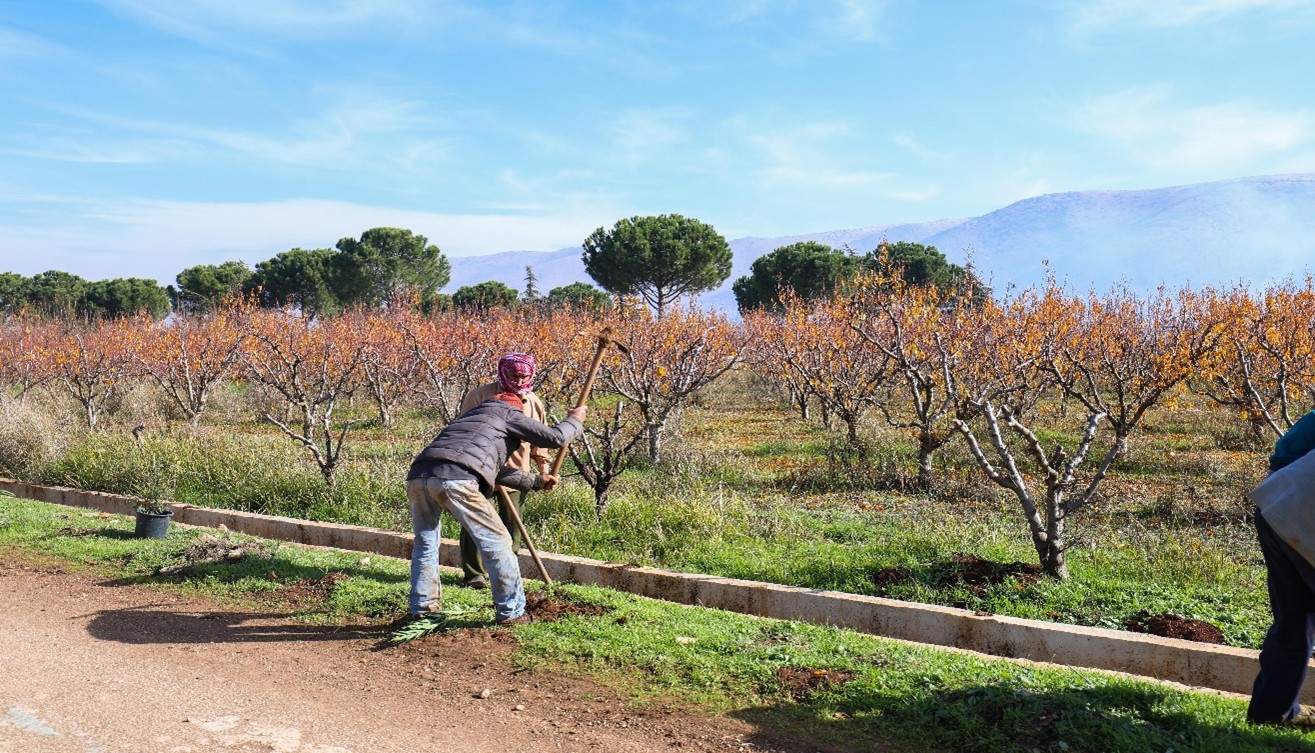e455c3d3-270e-4d02-8a6d-fd8932230d7c.png?sfvrsn=f8313f1_1)
“Creating a better environment while making a living through green jobs” in Anjar - a small model town in Lebanon
Figure 1 Hrair, a young man with a vision
31/12/2020
“I love my town deeply, and I want it to serve as a model for other towns in Lebanon”. These were the words of Hrair, our civilian hero, a 35-year old man residing in Anjar, located in the Bekaa Governorate. Hrair’s work primarily centers around agriculture, where he plants strawberries and maintains various sites established by several different projects and initiatives. In close partnership with the Municipality, Hrair works together with his friends and families as a dynamic group that is deeply rooted in their town. They are confident that through their collective efforts they will be able to maintain the beauty of their town and to secure a sustainable livelihood to their community for years to come.
Funded by the Government of South Korea, the Food and Agriculture Organization of the United Nations (FAO) implemented the project “Enhancing the Resilience of Vulnerable Refugee Communities through Cash-for-Work in Anjar” in 2019 and 2020, in collaboration with the Ministry of the Agriculture, two partner NGOs, Lebanon Reforestation Initiative (LRI), and the Association for Forests, Development and Conservation (AFDC), as well as the Municipality of Anjar.
This project holds a special significance, given the unique nature of Anjar. The town is built on a wetland, surrounded by forests and is highly susceptible to forest fire. Agricultural fields in Anjar are situated near a river, and a small wet land lies adjacent to them, making them vulnerable to floods. Additionally, being near the frontier with Syria, Anjar and the surrounding towns host a large community of Syrian refugees.
Hrair and his colleagues have always dreamed of their town to serve as “a green role model”. They believe that creating a better environment for the wildlife, birds and local communities in the town is essential to a bright future with a sustainable livelihood system. His vision was to increase the forest surface by planting native trees and aromatic plants while managing the existing forest sites to reduce the risk of forest fires in the uplands. Hrair and his colleagues remain committed to maintaining the riverbed and the riparian forest, to reduce the risk of floods while preserving the habitat of indigenous species, including the native otter.


Figure 2 Lebanese and Syrian laborers working together in Anjar - Figure 4 Planting a Green Belt along the agricultural roads to protect the fields from sand storms
Though the main objective of the project was to provide support to the Syrian refugees and their host community, it has also played a vital role in restoring Anjar’s landscape and its diverse ecosystems through strengthening the agro-sylvo-pastoral system that serves as a foundation for the livelihood system. Moreover, it has contributed to fostering Anjar as a potential model for Green Cities, highlighting its ecological sustainability and ability to live in harmony with nature.
The project encompassed an ambitious reforestation and forest management initiative, covering over 25 hectares of mountain and riparian forests. To protect Anjar and its fields from sand storms and dust storms, a green belt was established along 9 kilometers of roads bordering the agricultural fields and the inner roads of the town. Fruit trees and aromatic plants were carefully selected for the green belt to attract birds, especially the Syrian Serine, and to provide nourishing fruits for the local people. Additionally, various aromatic and culinary plants such as oregano, rosemary and sage were planted in different sites to further support the livelihood system.
Remarkably, the project has provided more than 11 000 days of work for both men and women from the local and the Syrian communities. It directly benefited over 150 households from both communities, effectively alleviating their economic difficulties through green job opportunities.

Figure 5 A Pomegranate Tree, one of the national trees of Armenia, was planted in the garden of the Municipality to celebrate the friendship between Anjar and the Republic of Southern Korea in Lebanon
The project contributed to reducing the risks of natural hazards, including forest fires, droughts, and sand winds, while improving the resilience of both ecosystems and communities against such disasters. Furthermore, the project has also fostered stronger relationship between both communities in minimizing the potential sources of conflicts.
One of the significant strengths of the project was the technical support provided to the beneficiaries and the positive work environment that strengthened the collaboration between the local community and Syrian refugees. A three-day training on team management, communication and leadership was conducted for the supervisors of the working teams, in addition to the training delivered by the NGOs under FAO’s guidance on the planting and management practices.
Reflecting on this initiative, Hrair expressed his gratitude, saying “Now I have more connections and more dedicated friends. This project has improved my situation and made me gain more knowledge about reforestation and forest management topics. I am now able to work in all these fields thanks to the tremendous support received from FAO.”
Finally, Hrair joyfully announced, “I am happy that with the work done under this project, we created a new way of life in our village and we managed to establish many techniques to deal with the effects of climate change”.
